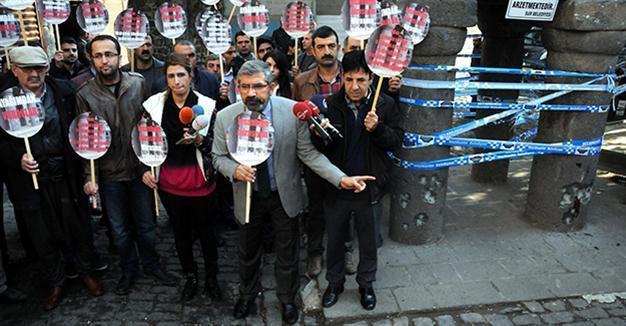‘We fear Tahir Elçi case will turn into unsolved murder’
Öykü Altuntaş / Istanbul - Doğan News Agency

DHA Photo
Diyarbakır Bar Head Tahir Elçi’s murder could “turn into an unsolved murder,” said Diyarbakır Bar lawyer Mahsuni Karaman, adding that the case’s footages should be examined by “independent referees.”
Karaman told Doğan News Agency (DHA) that the his team was not certain about whether the exact moment of Elçi’s shooting was purposefully cut in the footages; however, an investigation and data collection conducted by the police in a case involving police officers themselves “casted doubt, right of the bat, on the efficacy of the upcoming legal processes.”
The Diyarbakır Bar Commission, including Karaman, has underlined “the exact moment of the shooting, which lasted 17 seconds, that killed Tahir Elçi in Diyarbakır on Nov. 28 was not in two police footages” in a statement this week. The commission has stated “the possibility of interference” in the tapes.
The police officer who owns the footage has testified that “he crouched down while taking the footage during the most critical time and after having noticed the recording was stopped, he restarted taking the footage,” Karaman said.
The lawyer added the comission had noticed a “slight interruption” in the footage. “We do not say the footage was cut for sure; we think it casts doubt as the recording stops right at the moment of the shooting,” Karaman said, adding that “the nature of law demands us to be suspecting.”
But what is the importance of this 17-second-long footage?
Diyarbakır Bar lawyer reiterated that during the event, several reporters had turned their cameras in order to show militants running towards them, with Elçi “standing two to three meters behind the cameras.”
“Footage shows militants passing near the shooting scene, then we find Elçi’s body on the ground. This could be a coincidence; reporters would head for the militants, of course,” Karaman said.
On the other hand, he added, “We suspect that Elçi’s shooting occurred when a second demonstrator approached Elçi and the row of the Four-legged Minaret; the suspect then threw his gun near police officers.”
Lawyers of the case suspect that “Elçi was shot dead in a short moment in the middle,” of the footage, garnered from examination of footages displaying Elçi’s position before and after he was shot, Karaman told DHA.
“Thus, we believe the possibility that any footage could include this particular moment and we demand the inspection of a potential [purposeful] interference in the digital data, to be conducted by independent and impartial third party institutions and experts,” he said.
According to Karaman, “Elçi’s assassination marks a different nature because of Elçi’s reputation, status, identity, human relations and the fact that he was shot following [the attempted arousal of] nationalist sentiment” amid Turkey’s security tension.
“In this regard, we speak of a possibility that Elçi, a person who should have been under the state protection, was shot by the bullet of the police, men of the state” said Karaman.
Karaman believes the footages are the key to solving the murder.
Karaman reiterated that the bullet that killed Elçi was not found as “evidence was not collected at the actual scene of the shooting, due to security concerns raised by the prosecution.” Also, no witnesses have stepped forward from the crowd present at the time, indicating a third problem in the case, he added.
“Regardless of excuses, not collecting evidence is spoliation of evidence by means of omission,” he added.
Officials have defended that the collection of evidence was interrupted by “ongoing clashes” at the scene after the incident.
Karaman likened the Tahir Elçi case to the legal procedures the case of Turkish-Armenian journalist Hrant Dink faced. Dink was murdered in Istanbul in 2007, after Dink had been previously prosecuted and convicted of “insulting Turkishness.” In a similar fashion, Elçi was detained after he said the outlawed Kurdistan Workers’ Party was not a terrorist group on a televised debate. Both received numerous death threats, Karaman added.
Elçi’s murder could “persist for years and assume the traits of an unidentified murder,” Karaman said.
Diyarbakır Bar’s Lawyer concluded that all potential footage were crucial in solving the case and ensuring that Elçi’s case did not fade out as another unsolved murder.
